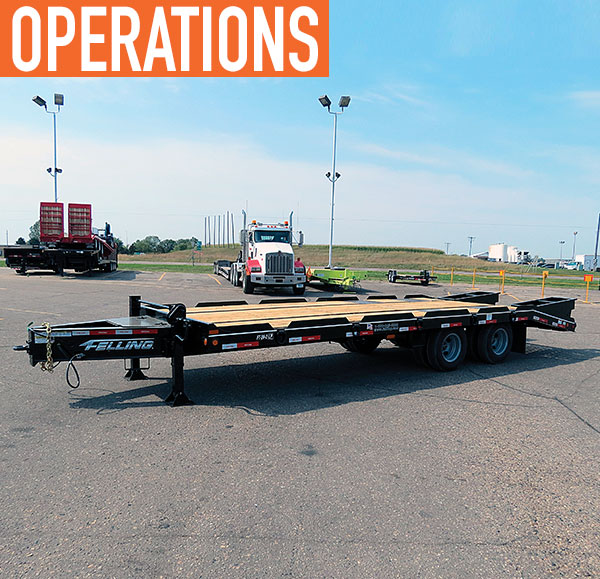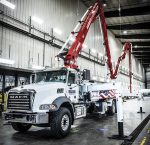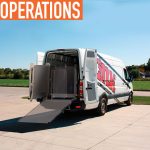You officially made the switch from the heaviest duty pickup you could find to something even heavier duty. Your Ford F-350 King Ranch, built as tough as ever, wasn’t designed to handle the load you carry day after day and endure the commute back and forth between your home and office. With Ford’s line of medium-duty F-550, F-650, and F-750, and with the introduction of Chevy’s Silverado 4500HD, 5500HD, and 6500HD and International’s CV, making the switch from a light-duty pickup to a medium-duty workhorse was simple and practical for your business.
WHAT’S THE JOB?
Now that you have the truck spec’d to please and ready for anything you can throw at it, perhaps your trailer could use an upgrade—after all, you bought your medium-duty truck to haul heavier loads for longer. Although buying a trailer for a medium-duty truck has similarities to buying a trailer for light-duty trucks, there are some differences.
Whatever the size of your business, whether you’re buying a trailer for one medium-duty truck or 50, it’s important to pair the right trailer with your load. As “compact” equipment continues to get larger and heavier, the need for medium-duty trucks and trailers is becoming more commonplace. The same operator that ran a pickup, 6-ton trailer, and a skidsteer 10 years ago is now using a medium-duty truck, 10-ton deck-over, and a large frame compact track loader. Everything is getting bigger and heavier.
If you’re a contractor carrying a bulldozer, a government utility vehicle hauling a pole trailer, or a landscaper carrying an excavator, you need a trailer that’s ready for your job.
THINGS TO CONSIDER
Any large fleet purchase should be carefully considered. Is the asset really needed or just wanted? Can the company make do with what it already owns? Sometimes the answers to the questions are easy to come by, and other times it’s more of a toss-up. Once it’s decided that a new medium-duty trailer must be purchased, there are additional considerations.
Each business will have its own priority when it comes to purchases, and cost usually ranks high. But there isn’t a benefit of buying the most affordable trailer if it leads to endless repairs and more trouble than you’re ready to handle. That’s why, although cost is important, it can’t be the only consideration.
Another factor: capability. What will your haul look like? Are you carrying equipment, supplies, or both? Your trailer should be more than capable of handling even your heaviest loads with little strain or issue. Will you haul once a month, once a week, or every day? Although important to all owners, the durability and reliability of a trailer won’t be as important to the owner who hauls once a month versus the owner who hauls every day.
Ease of use is also worth considering. Loading a trailer should be safe, not complicated. If you’re hauling equipment, your employees should never be tempted to use makeshift ramps in order to get to a jobsite more quickly. A trailer used for equipment should include ramps. Should your trailer have multiple cargo securement options, or will a few tie downs do? There’s nothing worse than getting all equipment and supplies loaded to discover it can’t be properly secured.
Finally, trailer owners should consider the support from the dealer or manufacturer from whom they purchased their trailer. When problems arise, you often need immediate assistance to get your equipment and supplies to the jobsite as quickly as possible. Before you buy a trailer, ask about the dealer’s support program.
MAINTENACE
Once you’ve purchased a trailer for your medium-duty truck, it’s important to understand medium-duty trailer maintenance—which slightly differs from maintenance of light-duty trailers.
Maintenance of a medium-duty trailer is about as simple as a trailer for a light-duty truck, but there are generally more things to inspect given the heavier loads these trailers carry. In addition to daily checks made on a light-duty trailer, owners should inspect frame structure and give additional attention when inspecting tires and brakes on medium-duty trailers as all three take a beating when heavy hauling.
BEFORE YOU GO
If you’re new to the medium-duty truck and trailer segment, it’s necessary to fill you in on the following important facts. When it comes to purchasing a medium-duty trailer versus a light-duty trailer, the process is the same with one exception. Trailers that exceed a GVWR of 26,000 lbs are subject to 12% Federal Excise Tax in addition to other applicable state and county taxes. Additionally, medium-duty trucks can pull trailers designed for a light-duty truck but not vise-versa.
Another thing to consider is that the driver of a medium-duty truck/trailer combination is required to hold a license that allows them to operate a combination of a certain weight class, making them legal to operate everything with a lower capacity. Operators of light-duty trucks that are not licensed accordingly cannot legally operate a medium-duty truck/trailer combination.
With all of the above consideration in mind, once you’ve purchased your trailer, inspected it for maintenance, and have a properly licensed driver behind the wheel of your medium-duty hauler, you’re ready to go wherever the road—or job—takes you!
FOR MORE INFORMATION
The contents in this article features contribution from Nathan Uphus, sales manager at Felling Trailers. Find out more about Felling Trailers, visit www.felling.com.




